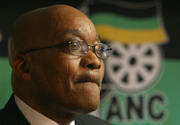 Ever since the end of apartheid it was clear that the ANC would win every election it contested until it split, its role in the liberation struggle determined that. But this one party dominance was always going to be a bad thing for South Africa; a fully functioning democracy requires competition between political parties—a party that knows it will win at the ballot box whatever it does becomes detached from the peoples’ concerns and corrupt.
Ever since the end of apartheid it was clear that the ANC would win every election it contested until it split, its role in the liberation struggle determined that. But this one party dominance was always going to be a bad thing for South Africa; a fully functioning democracy requires competition between political parties—a party that knows it will win at the ballot box whatever it does becomes detached from the peoples’ concerns and corrupt.
I hadn’t paid much attention to the recent split in the ANC as the numbers of defectors seemed too small to make much of a difference. But Donald G. McNeil Jr., who was the New York Times’ South Africa correspondent, argues that it could be more important than people have realised depending on who it could attract to join it. McNeil speculates that “the unthinkable — an endorsement of the new party by Archbishop Tutu or even by Mr. Mandela himself — would completely change the game.”
Of course, there is a danger that the break-away party is crushed and with it the hopes of a genuine multi-party democracy. McNeil reports that:
“Recent COPE meetings have been broken up by A.N.C. thugs. The leader of the A.N.C. Youth League — a position Mr. Mandela held decades ago — has threatened to “take up arms and kill for Zuma.” His colleagues keep calling COPE followers “cockroaches” — the Hutu epithet for Tutsis during the Rwandan genocide. The old guerrilla anthem Lethu Mshini Wami (“Bring Me My Machine Gun”) is sung by pro-Zuma crowds and Mr. Zuma himself called his rivals “witches,” who, in Zulu tradition, were killed by stakes driven into their anuses.”
One senses that the 2009 elections in South Africa will be of immense importance. If no counter emerges to the Zuma-led ANC, South African democracy will face a challenging few years given that Zuma has already shown himself prepared to challenge the rule of law and intimidate his opponents.







Comments